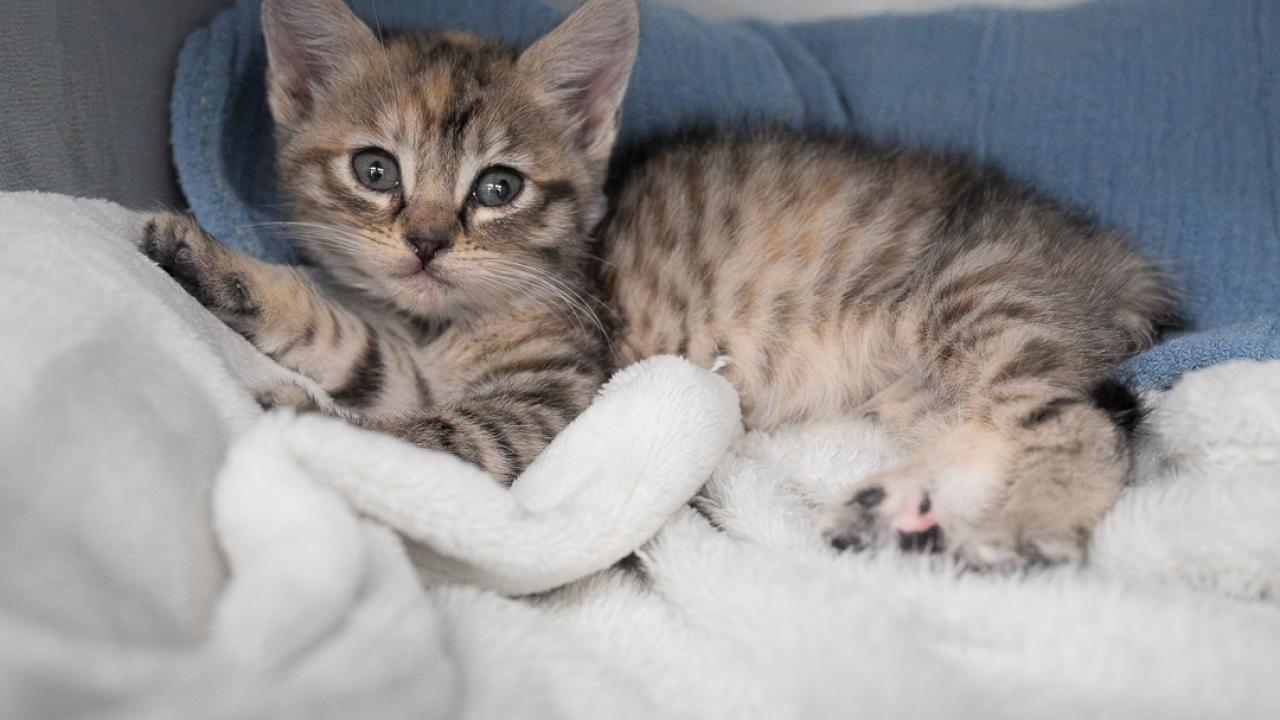
Feline Infectious Peritonitis, also known as FIP, is one of the deadliest diseases in cats. Tragically, it affects kittens the most, and is often fatal if untreated. Cats may carry the feline coronavirus without issue, but in some, a mutation causes it to develop into FIP, which can turn fatal.
In 2019, a groundbreaking discovery was made by the school’s Dr. Niels Pedersen, DVM, Ph.D., distinguished professor emeritus. Dr. Pedersen identified how the benign feline coronavirus mutates into the deadly form of FIP. Thanks to that discovery, treatments have been developed, and FIP is now treatable. His studies of antivirals led to a breakthrough therapy closely related to remdesivir. The success was overwhelming – and has changed the trajectory of a cat living with FIP.
Pedersen’s work also influenced the fight against COVID-19 in humans. Researchers referred to the success of Pedersen’s groundbreaking work and applied remdesivir to humans with COVID-19.
SOCK FIP, a foundation dedicated to the eradication of FIP, has contributed more than $700,000 to the school’s Center for Companion Animal Health (CCAH) to advance research on FIP, with the hopes that the research will result in the development of a vaccine to prevent the disease from taking hold in the first place. Further they inspired a multi-million dollar estate gift that is advancing our work.
The foundation’s contributions also set the stage for additional discovery in treating FIP. The current treatment is expensive, and finding pathways to treat any cat with FIP, along with cats that do not respond to the treatment, is a continued goal of both the CCAH and SOCK FIP, as is the development of a vaccine that can protect cats from getting the disease in the first place.
The SOCK FIP partnership has been instrumental in making the advances that we have had in our fight against this disease. We, alongside partners such as SOCK FIP, won’t rest until we know that this disease is no longer a problem in cats. That means finding a vaccine,” said Michael Kent, MAS, DVM, DACVIM (O), DACVR (RO), ECVDI (RO Add on), professor of radiation oncology and director of the CCAH.
The center, said Dr. Kent, is building upon the decades of work that Dr. Pederson began. And, where Dr. Pedersen’s work was so vital in developing drugs to treat FIP and the human COVID-19 virus, the hope is now to take what has been learned in treating COVID-19 and applying that knowledge back to cats in the form of an mRNA vaccine. Dr. Pedersen spearheaded this work, and it is being carried on by multiple researchers at the school. Dr. Kent noted that researchers are now applying knowledge gained from COVID-19 back to feline health, continuing the legacy of Dr. Pedersen’s work.
Dr. Kent reiterated the importance of philanthropy in helping fight this, and many other diseases that the CCAH is studying. “There is great urgency,” Dr. Kent emphasized. "Vaccines are entering initial clinical trials, and philanthropic support is critical to sustain this progress."
***
Learn more about FIP on the CCAH’s FIP web page dedicated to helping people understand the disease.
***
SOCK FIP is one of many foundations and corporations whose dedication to animal health fuels life-changing breakthroughs. Individuals can also amplify their impact through matching gifts or Donor Advised Funds, directing support to the causes that matter most.
To learn more about what foundation, corporate and matching gift contributions can do for the school’s research and clinical work, please contact Shari Kawelo, sekawelo@ucdavis.edu.
